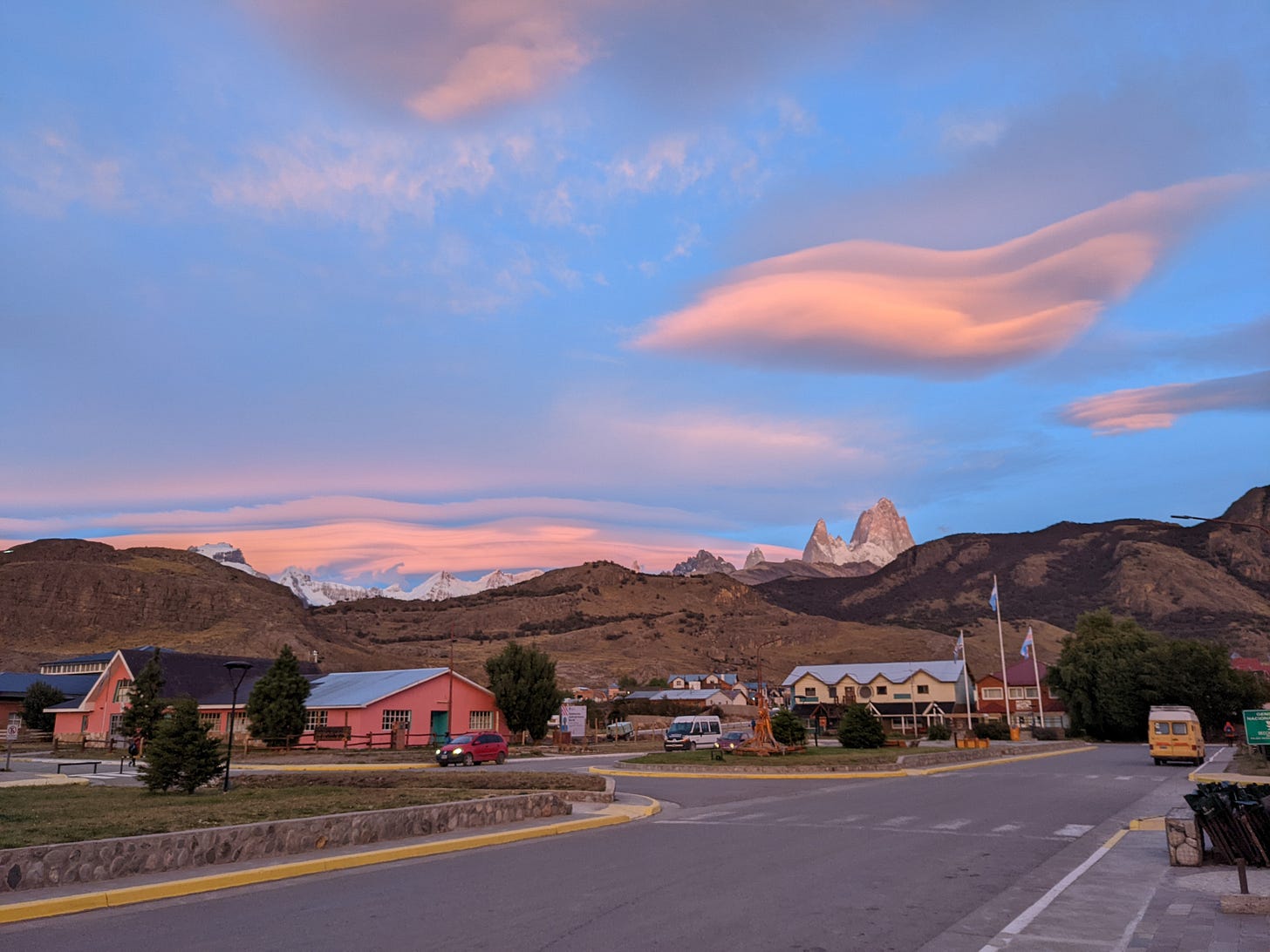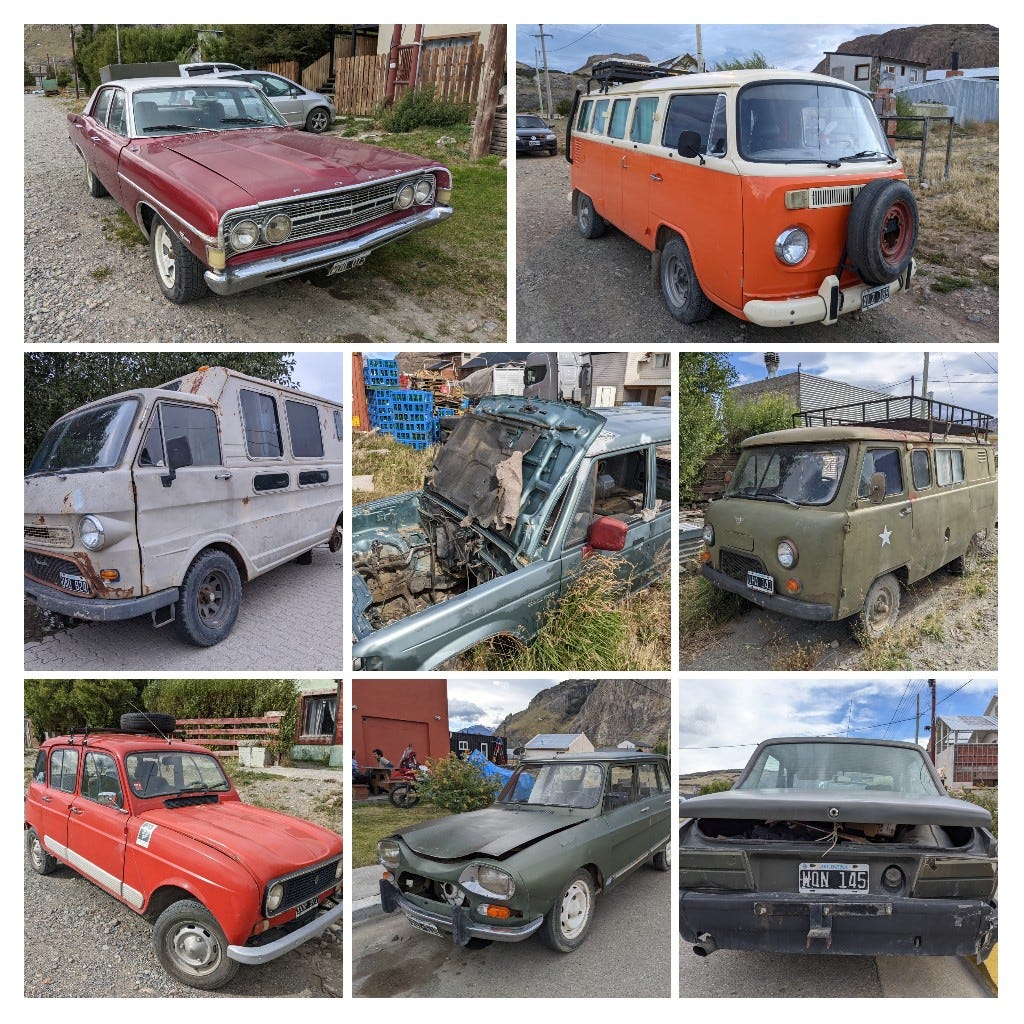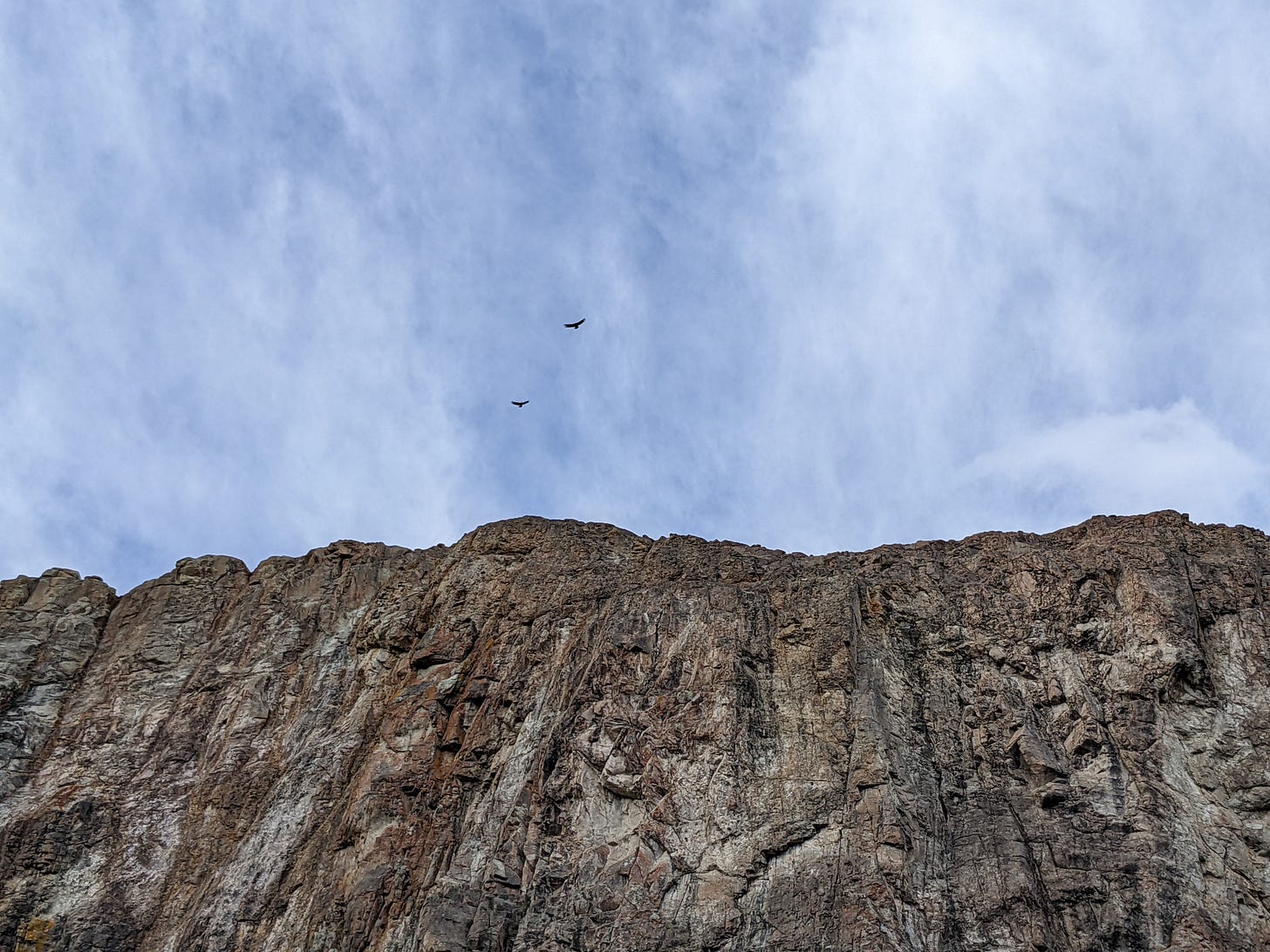El Chaltén, Part 2
on adapting to a new mountain town, march 2022
Five days in, you begin to understand the rhythms of Chaltén. The daily migrations of tourist hordes. The cheap empanada spots. The hours that businesses are actually open, in contrast to their posted times or the lies peddled by Google Maps.
No more crowds. You won’t deal with them. Embracing your inner early bird, you depart for a popular trail just after sunrise, ridgeline bathed in pinks or oranges, fuzzy clouds lingering like banana slugs below an azure ceiling.
The trail is yours. You indulge the glorious myth that you are an individual in the wilderness.
Other than two brave gentlemen who spent the night above the treeline with surprisingly little gear, you see no one on the ascent to Pliegue Tumbado. At the summit, you eat chocolate and drink 360 degrees of southern Andes.
Running down, you sail past uphill hikers, tossing them smiles and buen dias. Back in town by 11:30, showered, coffee in hand, ogling Fitz Roy’s naked massif, you sit contentedly with the realization that there’s nothing else to do today except read, write, eat, and dream.
Because now you’ve been here long enough to see the massif from different angles. Now you no longer need to strain your neck and gawk and dash for your camera every time the clouds part. Now you can genuinely enjoy this mountain paradise, quietly rejoicing at each beautiful moment, smiling only to yourself, for you released yourself from the internal obligation to document, capture, and share.
For you have the gift of time. For this is no hurried vacation, no rushed love affair, no weekend fling. For you have created a life that allows extended time in the mountains, and now you reap its rewards: slowness, non-ambition. A slug and a dullard you are, indeed—one that lingers in wild places and invites them to shape you, to whittle you down, to merge with you.
You begin to notice things as you wander around town, like all the interesting old cars. Chaltén is (almost) the end of the road at (almost) the end of the earth, a veritable Shangri-La of junkers. You watch three friends laugh as they push an old van (back window busted out, taped over) to help get it started. Here, cars still need friends.
You find the little church dedicated to deceased climbers, walls lined with framed pictures of mountaineers like saints. Crossing the river, you spy condors cruising the cliff above and the silver glint of climbing bolts below. A man with binoculars on the creaky wooden bridge tells you that the scavengers are dos metros entre alas. (Translation: big fucking birds.)
On the return, you scan the precipice for sneaky ways down, dreaming of future fun runs, gawking lustily as do with Sierra foothills, ridgelines on road trips, gravel roads from airplane windows. This world is pregnant with adventure, if we might only use our binoculars.
An Argentinian friend, currently out of town, lends you her little house, saving you from the hustle-bustle of hostel life. One of her friends swings by, dropping off sheets and towels, and alerts you to a few goings-on: a drum circle and a science talk. You say yes to both.
The drummers are celebrating Women’s Day in a semicircle of bright puffy jackets, strewn mountain bikes, mate gourds, and single kisses on the cheek. (Listen.)
The scientists discuss water quality, tree growth, and glacier recession in the valley. Your Spanish isn’t great, but it’s good enough to get the gist—and gist is all you need.
A fellow American scratches his head at the coffeeshop wondering what do with a cloudy day; you lend him one of your books; he returns it days later, grateful. An Argentine Couchsurfer invites you for a beer; the bar happens to have an excellent cover band. Popping into the hostel, the same affable Frenchman who you befriended in the kitchen lies splayed on the couch; he greets you by name. These little encounters fill you up; they humanize this new place; they make you feel accepted in way that big cities often fail.
You can’t help but compare to other mountain towns, each one you love for its own reasons. Chaltén is like Crested Butte, but rawer and not owned by Texas. Chaltén is like South Tahoe, but innocent and not trashed by casinos. Chaltén is like Wanaka, but lakeless and affordable. You’re falling in love with this place, too. You know it already.
You wander, you scribble notes, you process thoughts, you snap photos, you follow up on leads. You are a dirtbag flâneur. You revel in the digital disconnection, the lack of mobile data. It’s like the 90s all over again. If a friend doesn’t show up to an agreed-upon meeting place, oh well. That’s life.
Chaltén is an adventure town, but you no longer feel the need to drink what’s on tap. Lingering, adapting, understanding, embracing the self that you can never escape: that is the adventure.








I'm glad to see that you're viajando sin prisa, sin pausa. El Chalten looks like a dream. Any interest in guiding there at some point? I hear you can find neat little gigs in the summer that all you have to do is be along for the ride with other guides and be bilingual
Wonderful to read about your adventures. I am curious how you navigated Covid to stay safe when venturing out and being around folks, and how people in other countries are handling it compared to the US.